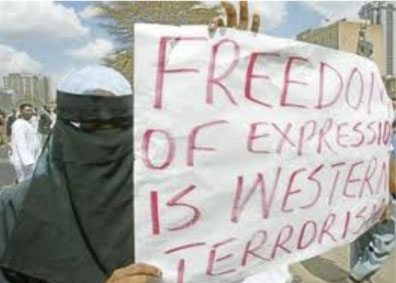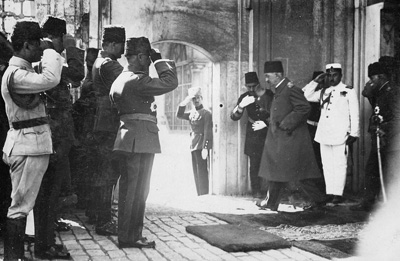
The failure to tolerate the legitimacy of denominational difference has led political authorities to engage in acts of expulsion, marginalisation, confinement and distortion, in acts of oppression and even the outright crushing of other religious groups over the course of Islamic history.
WHEN GOD ALMIGHTY addressed Muhammad with the words: Wouldst thou (Muhammad) compel men until they are believers?[1] that was a declaration of Islam’s confirmation of the right to difference, and its support for religious pluralism and the strong guarantee granted to humankind of their choice of belief and worship. If the Prophet did not have the right to impose his religion upon others by force, and that his only recourse was to Call unto the way of thy Lord with wisdom and fair exhortation,[2] then it follows that an ordinary man has even less right to impose his opinion on others.
And again, if compulsion was forbidden in religious matters it is therefore all the more forbidden in intellectual, political and social affairs. Moreover, there are a number of unequivocal verses in God’s Book which place on a legal footing the right of a man to differ on the grounds that this difference is divinely ordained and related to the exaltedness of the creation of humankind, and indeed that this right to difference constitutes the purpose of his existence. Consequently it is difference which safeguards the survival of Man on earth.
The Almighty says:
And if thy Lord had willed, He verily would have made mankind one nation, yet they cease not differing,Save him on whom thy Lord hath mercy; and for that He did create them [3]
and the commentators of the verse maintain that He created them that they should differ and compete for the purpose of building the world and enriching life, and for the purpose of development and progress. Indeed the Qur’ān makes of universal, natural, human difference a ‘grace’ and ‘benefit,’ one that God bestowed upon is servants as in the following:
And of His signs is the creation of the heavens and the earth, and the difference of your languages and colours.[4]
The Qur’ān also confirms in another verse that difference is a means to advancement, renewal and mutual cultural recognition when he says:
O mankind! Lo! We have created you from male and female, and have made you nations and tribes that ye may know one another.[5]
And it would be worth pondering on this inimitable miracle of the word ‘mutual recognition’ which covers all forms of human communication.
I might also virtually claim that the creation of mankind and his coming into the universe and descent into this world – as a species different from the species of the Angels and the Devils, and one equipped with intellectual, spiritual and physical capacities that qualify him for freedom of choice and, consequently, for being described in terms that man is more than anything contentious [6] – obliges us as Muslims to believe deeply in ‘the right to differ’ in terms of culture and behaviour. The practical fruit of this is ‘the acceptance of the other on his own terms and as he is’ in his creeds, in his denominations, in his rituals, just as the late Shaykh Mohammed Mahdī Shams al-Dīn put it.
Why then do we become irritated by difference?
If the Qur’ān duly confirmed ‘difference’ as a human right why then do we become irritated by this? Why do we not demonstrate this in our behaviour and in our relationships with each other? Why do we hear preachers, thinkers and shaykhs repeatedly reiterate the ‘freedom to dialogue’ nostrum and affirm the ‘right to differ,’ and make open show of respect in theory for ‘another’s opinion’ – but are unable to find these statements embodied practically on the ground? Why do we repeat the old saying “difference in opinion does not invalidate friendship” – only to then find that differences are turned into enmity and hatred? Sectarian differences are converted into bloody confrontations, denominational differences have been made into denominational intolerances, political differences into charges of treason and disbelief, while cultural and civilisational differences with those from another, superior culture are painted with the pigments of ideological animosity.
It may be that there are no answers to these questions, but I imagine that our inherited culture in some of its predominant elements is still preoccupied with ‘differences’ and looks upon them negatively as something that leads to division, fragmentation and sedition – things forbidden by the Qur’ān and warned against by the Prophet in a hadith that predicts the division of the Nation into ‘73 sects’ – all but one destined for Hellfire. This has led each sect to claim that it alone is the ‘saved sect’ and condemn other sects as destined for Hellfire!
So much for the religious, doctrinal level. But on the juridical level the Ahl a-Sunna wal-Jamāʽa have insisted that the doctrine is the correct one, one that is in line with the doctrine of the predecessors whilst other doctrines are simply distortions from the Right Path. This is why the faqīh as part of the general population, enthusiastically promotes this cultural climate condemning difference, and puts forward his juridical opinion as representing ‘the consensus’ as a means to suppress denominational competition and criminalise it.
Despite what has been said and continues to be stated that juridical difference is an expansive mercy – and it really is one – historical reality does not give evidence of this. The fanaticism of everyone for their sect increases day-to-day while his partisanship for his opinion and religious denomination only waxes stronger through conflict. This flies in the face of the Prophet’s hadith that promotes independent juridical reasoning (ijtihād) and indeed rewards it – for good or for ill. Ijtihād, after all, is the equivalent of difference.
Practical reality has made each sect distance itself from, and utterly reject, those with an opposing opinion, and even place them in the circle of the adversary for as long as they continue to differ, so that their belief may be written off as the belief of infidel, disbelievers, freethinkers, polytheists or heretics, of errant thinkers or hypocrites or degenerate folk who are to be warred against. This constitutes a lack of tolerance towards the right to differ and it dominates our history equally in the political arena with its results in the killing of Imām Husayn, the storming of Madīna and the destruction of the Kaʽaba with mangonels, the crucifixion of Ibn al-Zubayr, the abuse of the household of the Prophet, the digging up of the graves of the Umayyads and the persecution of Imām Mālik when he issued a fatwa annulling the requirement to give allegiance under duress. Similarly resulting from this is the persecution of Imāms Abū Hanīfa, al-Shāfiʽī and Ahmad and the killing of Ibn Jubayr and so on and so forth.
The failure to establish the legitimacy of difference in the religious arena led the Muʽtazila to use force to impose their convictions upon the people on the question of the ‘creation of the Qur’ān’, to the extent of oppressing Imām Ahmad. Lack of faith in the culture of difference in the denominational arena led some Shāfiʽī fanatics to issue a ruling concerning food tainted by a single drop of alcohol: it is to be thrown to the dogs or to the Hanafīs –on the grounds of rumours that the Hanafīs were licensing alcohol. Similarly, when a Hanafī fanatic was asked: is it permitted for a Hanafī to marry a Shāfiʽī woman? His reply was: “it is not permitted since her faith would be suspect.” This induced some of the Hanbalī fanatics to incarcerate the entire household of the faqīh Ibn Jubayr al-Tabarī and seal the door with a stone.
Lack of conviction in the right to religious difference led the faqīh Ibn Qayyim to compose his voluminous work Ahl al-Dhimma (‘The Protected People’, i.e. non-Muslims) so as to establish discriminatory rulings against them even though there was no sound legal support for this.
This failure to tolerate the legitimacy of denominational difference led political authorities to engage in acts of expulsion, marginalisation, confinement and distortion, in acts of oppression and even the outright crushing of other religious groups over the course of Islamic history.
If the Qur’ān confirmed ‘difference’ as a human right why then do we become irritated by this?
Of course there have been moments in history which embodied cases and examples of the legitimisation of difference, and there are some notable sayings such as that reported concerning Imām al-Shāfiʽī who is to have said “my opinion is correct but may carry within it some error, and the opinion of someone else may be erroneous but may still contain some truth in it”. Similar things were said of Imām Abū Hanīfa yet these examples and traditions are no more than bright flashes across the sky.
It may be that the first to confiscate the right of difference were the ‘Khawārij’ when they resorted to the sword as a means to resolve a political difference, but this process has persisted from the era of the Islamic caliphate and right up to the present day. We see its extensions represented in many examples in our own age, such as the bloody uprising of Hamas against the authorities in order to settle its political differences with Fatah.
Why are we unable to employ difference and deal with it outside a formula of racism?
We see It in the cleaving of Hezbollah to its security zones and its intensification with the weapon of ‘resistance,’ in its monopolising of patriotism and its many accusations of treachery and collaboration against the majority population! How would it have harmed either Hamas or Hezbollah if they had tolerated the views of others as another means of resistance and dealing with conflict? Compare with this what happened in Iraq, Sudan, Darfur, Somalia, Afghanistan and Pakistan and you can see that the various groups either do not maintain any tolerance of the right of difference or are simply unable to deal with this difference to achieve shared ends and spare these nations their human and material losses. Look at how Israel successfully manages religious and political difference in its society in the interests of strength and unity. Why are we unable to employ difference and deal with it outside a formula of racism?

Suggested Reading
Even today Arab society is unable to make a distinction between recognising the legitimacy of others and confirming the validity and truth of their doctrines, and this is why other religious denominations – of celestial or human origin – suffer from the infringement of their rights. An example of this is what the Baha’is have been long suffering in Egypt with their being forced to register the word ‘Islam’ in the box marked ‘religion’ so as to obtain an identity card, on the grounds that Al-Azhar and all religious scholars of other faiths do not accept that Baha’ism constitutes a religion! Even the judicial authorities do not permit inserting the word ‘other’ in the box marked ‘religion’.
And the question to be put to these is: who says that allowing the Baha’is to write down the name of their religion somehow confirms the truth of this religion? The legitimising of the existence of another and the recognition of his belief and his rights do not at all entail confirmation of the truth of his beliefs. The two issues are entirely separate. Muslims, after all, established tolerance towards the Magi, the Zoroastrians and the Sabians and gave them full protection and security, yet this was not a result of any conviction as to the truth of their religious opinions.
[1] Qur’ān X,99.
[2] Qur’ān XVI,125.
[3] Qur’ān XI,118-119.
[4] Qur’ān XXX,22.
[5] Qur’ān XLIX,13.
[6] Qur’ān XVIII,54.



